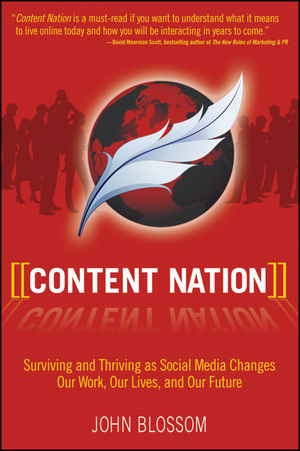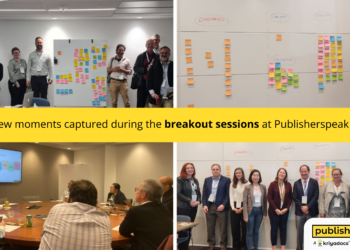I should be more gracious. I should be more kind. But the keynote speech by John Blossom at the 2009 ALPSP Conference just got me mad.

The title of his talk, “Content Nation: Social media and the effects of Internet technologies on publishing,” is also the name of his new book, a collection of blog posts, edited and published, in print, by John Wiley.
Now don’t get me wrong. I was not upset that Blossom’s talk was an hour-long advertisement designed to sell his book, something David Crotty wryly notes as the business model of many Web 2.0 publishing ventures. It was the content that got me mad.
If the talk had been merely a collection of unrelated stories about how social media changes peoples lives, my cognitive state would have resulted in mere boredom. But these stories were connected with several troublesome themes:
- technological determinism
- biological determinism
- cultural determinism
- and more disturbingly, a notion that #1 fuels #2 and #3
For example, Blossom began his talk with a collection of oft-described ways in which technology has changed the way we communicate. From a video of Sadam Hussein‘s execution being captured on a cell phone and posted on YouTube to Google Maps mashups we were given the impression that it is technology that drives and determines human behavior. This is technological determinism — a limited worldview in which technology is disruptive and that ignores the fact that most technology is ignored, fails to be brought to market in the first place, or ceases to be perceived as technology after it has been widely adopted.
Following this introduction, Blossom produced an image of a collection of prehistoric stone spearheads and a pronouncement that new technology is followed by rapid changes in our DNA; that is, he made an argument that technological development spurs biological evolution.
Technology changes our DNA?
Now I’m getting perturbed.
What Blossom forgets is that most human evolution is cultural — not biological. Each one of us is adaptable, not because we can shuffle our genes at will, but because we are in possession of large brains that allow us to deal with changing environments and develop new strategies. Were we not adaptable, generations would go through their lives without the ability to type with their thumbs. We’d have to wait for several generations of strong selection before the chance of a random mutation that would endow a new generation to take advantage of mobile texting on a Blackberry and then wait several more generations until our offspring possessed thumbs which resisted tendon and joint damage through repetitive use.
But his talk went further, taking on a moral tone. We need to change. We need to adapt. Technology takes us to a place where we can reconsider our humanity — from the little girl who spends her days scavenging through a garbage dump looking for food and other cast-offs from a throw-away society, to the young boy who receives a new laptop from the One Laptop Per Child initiative, Blossom asks us to look deeply inside ourselves, to consult our sense of humanity as citizens of the world.
Social media brings us together in ways that we never hitherto imagined. More is better, and somehow, this is supposed to translate into making us more human.
If you failed to understand his argument the first time, don’t worry — Blossom is working on a sequel.
Related articles by Zemanta
Discussion
6 Thoughts on "“Content Nation” — Self-promotion in the Age of 2.0 Buzzwords"
Re: culture, evolution, reconsidering humanity. Why do we think females are continually portrayed as impoverished — even in hypotheticals?
If social media is supposedly making us “more human” what are we to make of the impact that social media have had on the political discourse in this country over the past five years?
I often find myself in a similar position listening to keynote speeches. But I wonder what the rest of the audience thought – were you surrounded by rapt faces of scholarly publishers who had seen the light?
I ask because I worry that, in these ‘disruptive’ times, we are in danger of focusing too much on the medium not the message. As you – and Kent – have said before, successful technology quickly reaches a point where it is no longer perceived as technology. If scholarly publishers in the meantime become obsessed with the technology and forget their traditional strengths – filtering/generation of content – could we end up believing everything people like Blossom say – failing to realize, for example, that a ‘scholarly’ publisher would not publish content claiming new technology increases DNA mutation rates?
Philip Davis says:
“[…] most technology is ignored, […] or ceases to be perceived as technology after it has been widely adopted.”
Yep.
Scenario: [witness cool event] “*Man* I wish I’d thought to bring a camera!” [3 a.m. – sit bolt upright in bed] “CR@@@@@@@P! THERE’S A CAMERA ON MY NEW PHONE!!!!” [Spend next two weeks taking pictures of everything w/ phonecam.] [forever after] It’s only a phone if it has a camera. Everything we see now can, be shown to our friends later. If we can call them, we can be their remote eyes.
I wonder how many technologies this happens with? Hypothesis 1: A Great Many. Hypothesis 2: The rate of leap from “complete obliviousness to ability at hand” to “clicking one’s heels together 3x & muttering ‘there’s no place like home'” will vary from person to person and be experience-driven. Hypothesis 3: It mostly is a leap; or *rapid* transition, or set of leaps: from oblivousness, to euphoric awareness, to ‘prosthesis analog’.
In fairness to John Blossom he was asked [by me!] to speak specifically about his book, Content Nation. If this was a mis-judgement, it was mine not John Blossom’s!
Also, since the book is freely available online (at http://www.contentnation.com/wiki/show/Content%20Nation%20-%20The%20Book), I think that John was really ‘selling’ the ideas in his book.
Gotta say that I enjoyed John’s talk and I also enjoyed Phil Davis’s at the same conference…
Philip,
I thank you for your comments, though I would be more thankful if they had been based on an actual reading of my book, which, as Ian points out, is available in full draft form online for anyone to consider. Having been asked to give a synopsis of the themes in the book, I did just that, so hopefully you will have an opportunity to engage them in some appropriate depth. I do apologise if the depth of my talk covering this far-ranging book was unsatisfying as a result.
As publishers who are responsible for progressing human thought, I do believe that scholarly publishers bear a particularly heavy burden in having to consider what is most certainly a moral imperative to respond to both the challenges and the absolute necessity to advance human knowledge more uniformly, more effectively and more rapidly. I believe also that academic and learned professional society publishers are particularly well suited to benefit from the potential for social media to help them meet those challenges. ALPSP member societies are, most assuredly, confluences of peer minds who benefit from the most efficient and effective communications. I see no reason why ALPSP members should not delight in the potential for that goal to to be attained more effectively through emerging technologies such as social media.
In a sense I am glad that you found my talk to be somewhat disturbing, for the ultimate conclusions that the book “Content Nation” draws should be quite disturbing to any thoughtful person. Even some vocal social media advocates have found the conclusion of the book to be a chilling vision. However, if centralised publishing is unable to respond to the challenges of rapidly changing environmental and social conditions whilst new forms of publishing that have the potential to respond to those challenges are ignored because the ultimate outcomes that they enable are unsettling to some, then we should be rather more disturbed. Far more than a few generations of humankind are at stake: humankind itself lays in the balance.
Technology does affect evolution directly, from moths in England that adapted darker shades to survive in forests covered with coal dust during the height of industrialism to the current impact of industrialism on species globally. You are correct that not all technologies may impact evolution at a significant scale. But pervasive phenomena can be expected to have pervasive effects, with the influence of pervasive technologies providing no exception.
In spite of these long-understood causal relationships, apparently some still think that humans are exempt from natural selection because of our opposable thumbs and large brains. These are great adaptations that have served us well in our current – if brief – interglacial period. But as we approach the probable end of that period, with a global population and a technology base which dwarfs that found when those adaptations entered our DNA through the confluence of natural selection, technologies and social constructs, it’s questionable whether these alone are enough to ensure our survival as a species. As described in some detail in the book, my premise is that over the next ten thousand years we will see a merging of biology and technology that will enable adaptations far more rapid and responsive to changing conditions and far more significant than our fingers adapting to a typewriter keyboard, adaptations which, in all likelihood, will result in new species of beings, related to us, to be certain, but perhaps closer to our future than to our past.
This will come to pass not just because we will be able to do it technologically but because the social organisation enabled via social media tools will favour those who choose to do so in response to environmental challenges. Early homo sapiens, able to shoot arrows at fast-moving elk, were in no different a situation than us as we face fundamental choices that will favour some species over others. It was not the arrow that killed the elk, but the combination of the arrow, the society that was organised to make its development possible and the environmental changes that made such a development a necessity. Each must have critical mass to influence a major shift in species dominance. I do believe that social media, moreso on the scale of millennia than the brief reign of centralised publishing, will be one of the critical technologies that will enable this to occur. Given centuries or even brief spans of generations, environmental adaptations designed by societies organised through centralised publishing inevitably fail. Given millenia, environmental adaptations organised by looser social organisations seem to succeed. Social media would seem to offer a more adaptive confluence of both forms of communication that will enable both rapid responses to environmental changes and flexible re-adaptations to ensure long-term social and environmental stability.
As you point out, not all technologies will take on a role pervasive enough with supporting circumstances to affect such changes. Yet one would think that a swath of thousands of technologies, already in the hands of 1.4 billion people, which change their range of communication from a handful of people to a potentially global audience instantaneously from virtually any location on the planet and beyond, might qualify for having such an impact.
If you do have an opportunity to read the book, I do hope that you consider its core premises with more depth than in this brief post. Once again, I do apologise if my brief talk failed to capture the book’s essence effectively; it does cover quite a bit of ground. Perhaps at another time we can define an event in which we can open this interesting debate again for others to consider.
Yours very truly,
John Blossom
Citizen
Content Nation
![Reblog this post [with Zemanta]](http://img.zemanta.com/reblog_e.png?x-id=0f613989-02e2-47a1-aa70-0cef710d0a39)


